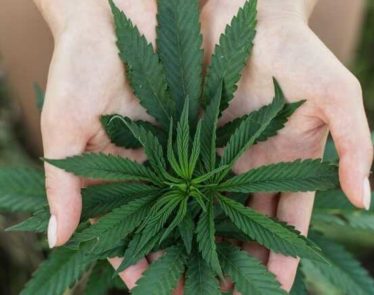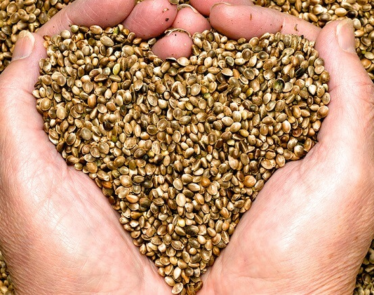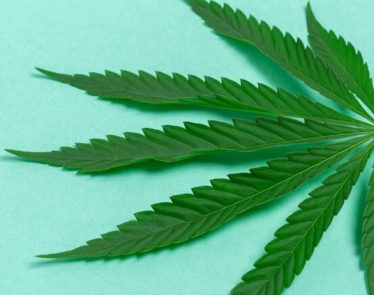
The cannabis industry throws around a lot of terminologies; Cannabinoids, Terpenes, Tetrahydrocannabinol (THC), and Cannabidiol (CBD) are some examples. You've probably read these terms but do you know what they are? You've read about hemp seed oil and CBD oil but what is hemp biomass?
It can be a conundrum out there, so we are going to sort out what hemp biomass is today!
What is Hemp?
To understand hemp biomass, let's first get our heads around hemp. What is it?

Also referred to as industrial hemp, it is a variety of the 'Cannabis Sativa' species of cannabis plant. Sativa plants typically have a higher concentration of CBD enzymes and cause no mind-altering effects, but we will delve into this below.
Hemp is in the same species as marijuana but is genetically very different from marijuana in chemical makeup. Its cultivation methods and uses can be vastly different too.
It also looks different! Typical hemp plants are skinny and tall, distinguished by long narrow leaves that concentrate at the top of the plant. Few branches grow below this top part of the plant, which can grow anywhere up to 20 feet. It also requires minimal care and is adaptable to grow in most climates, making it very versatile.
Hemp plants are grown in large plots, planted as close as four inches apart from each other. A plant reaches maturity somewhere between 108–120 days.
Hemp vs Marijuana
Most importantly, what truly sets hemp apart from marijuana is that it has less than 1% THC. This is the psychoactive component that gives the 'high' of smoking marijuana. Marijuana, on the other hand, has an abundance of THC, usually with concentrations between 15–40%.
The lack of presence of THC within hemp also puts its legality on a different scale, so that in most countries across the globe, hemp is entirely legal to cultivate and use.
Marijuana, on the other hand, toes the line of legality in most countries. For example, across most of Asia it remains entirely illegal, however, it is legal both medically and recreationally in Uruguay and Canada. In America, many states have made marijuana's use legal for medical reasons but not for recreational purposes. Only nine states have made it legal recreationally. Further, in some jurisdictions across the globe, recreational marijuana is still illegal, but it has been decriminalized.
Marijuana's legal ambiguity has to do with the high levels of mind-altering THC that the plant carries.
Hemp and Cannabidiol
Because it is a member of the cannabis family, hemp is still rich in cannabidiol. This is a useful component, regularly used for health benefits. Because of this, hemp offers similar relaxation and health benefits as marijuana but, as stated, without the psychoactive high.

So because hemp produces a variety of THC-free CBD products, as CBD use grows across the world, hemp use is also growing.
Benefits of Hemp
In brief, here are some benefits of hemp:
- Protein. Hemp seeds are a complete source of protein, providing all nine essential amino acids.
- Unsaturated fats. It is full of healthy polyunsaturated fats including omega-3 fatty acids.
- High in fiber.
- Packed with minerals and vitamins.
So, hemp is beneficial for health reasons—that's clear. But it is also used for industrial purposes as it is capable of producing hundreds of resources. This includes paper, clothing, building materials, biofuel, food products, oils, and more.
>> What is the History of Marijuana?
So What is Hemp Biomass?
Now that we know about hemp, what is hemp biomass?
Biomass is described as "waste material from plants or animals that is not used for food or feed."
So hemp biomass is the organic material of the hemp plant that is left over after the flower is harvested and processed. That flower usually goes on to make the hemp products you are familiar with, such as hemp oil, foods, and creams, etc.
But the waste, such as the stalks and the leaves, can be used in alternative ways, most commonly, as energy fuel. Another term for the 'waste' products of hemp are the by-products.

So, put simply, when we ask what is hemp biomass, we answer that it's the bulk leftovers of the hemp plant that can be converted into and used as fuel.
As stated, biomass is usually used to produce fuel. However, some producers still use it to extract hemp oils, CBD distillate, and CBD isolate.
Hemp Biomass as Fuel
In essence, biomass is organic material that comes from plants and animals, and as such, it is a renewable source of energy. In this instance, we are talking about hemp as our organic material.

Because hemp is a plant, it contains stored energy from the sun. Every plant on our planet goes through a process called photosynthesis whereby it absorbs the sun's energy to use as its own. Therefore, hemp biomass has collected an abundance of stored energy, and when that biomass is burned, the chemical energy in the biomass is released as heat.
Growing hemp is a great sustainable fuel alternative, especially for small farmers, and as they are renewable, biomass fuels are great for the environment.
Hemp is also a fast grower, usually reaching maturity in only four months. This means vast areas of yield can be turned over in a short amount of time.
Using Hemp Biomass as a Fuel
Hemp Biomass can be burned directly as a fuel. Or, it can be converted to liquid biofuels or biogas and then used as a fuel.
The most common example of a biomass fuel is wood. Wood is burned in heavy industry to produce heat and also to generate electricity. However, the most familiar use of it as a biomass fuel is simply burning it in a fireplace to heat a building.
While you scratch your head asking what is hemp biomass, the simplest explanation is very possibly right in front of you!
What is Hemp Biomass: The Takeaway
So there you have it! We've explained what is hemp biomass! Because hemp is so versatile and rich in health benefits it uses will only increase in the years to come. This also encourages the use of hemp biomass as a sustainable and renewable energy.
Featured Image: Depositphotos/© artursz













